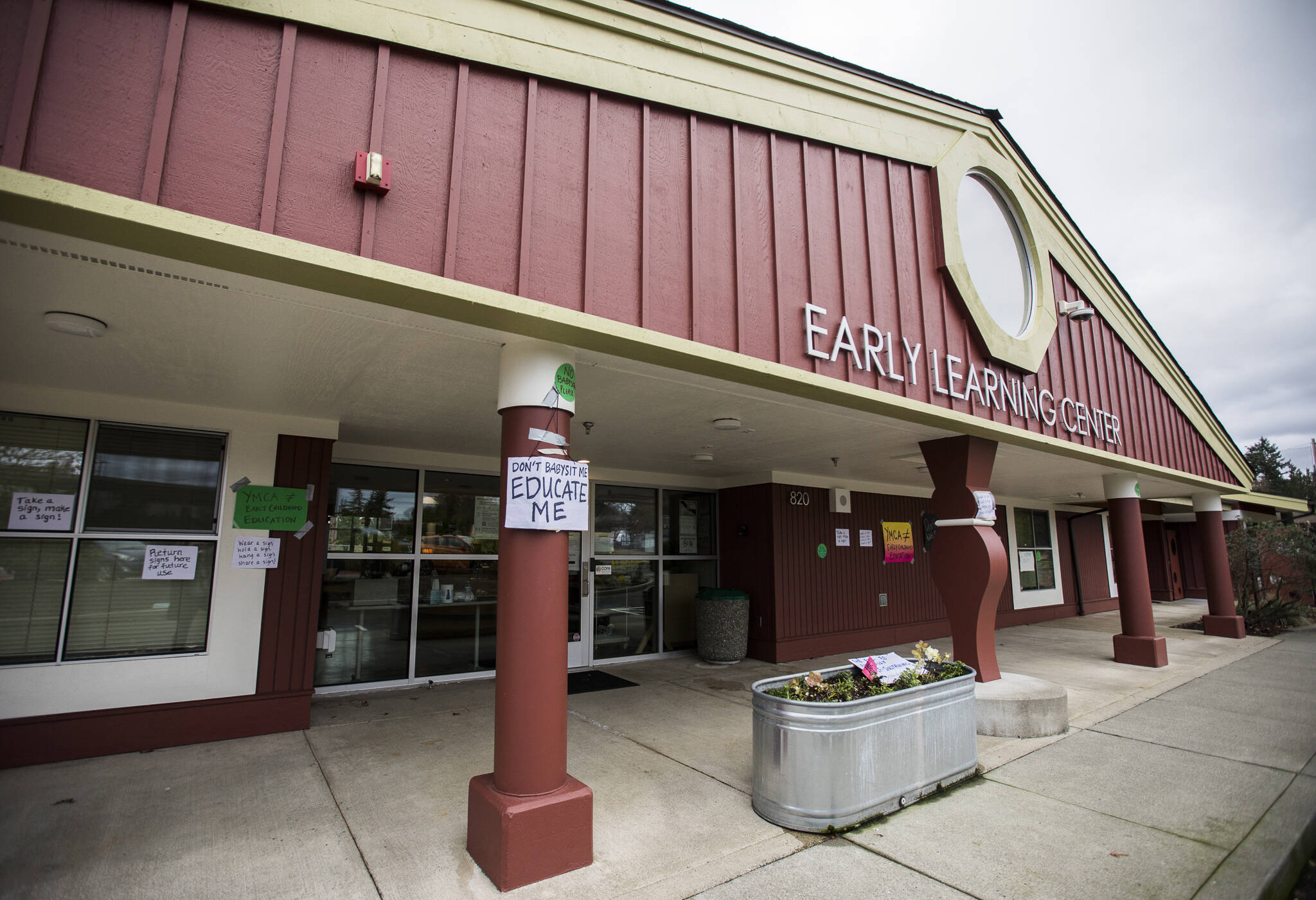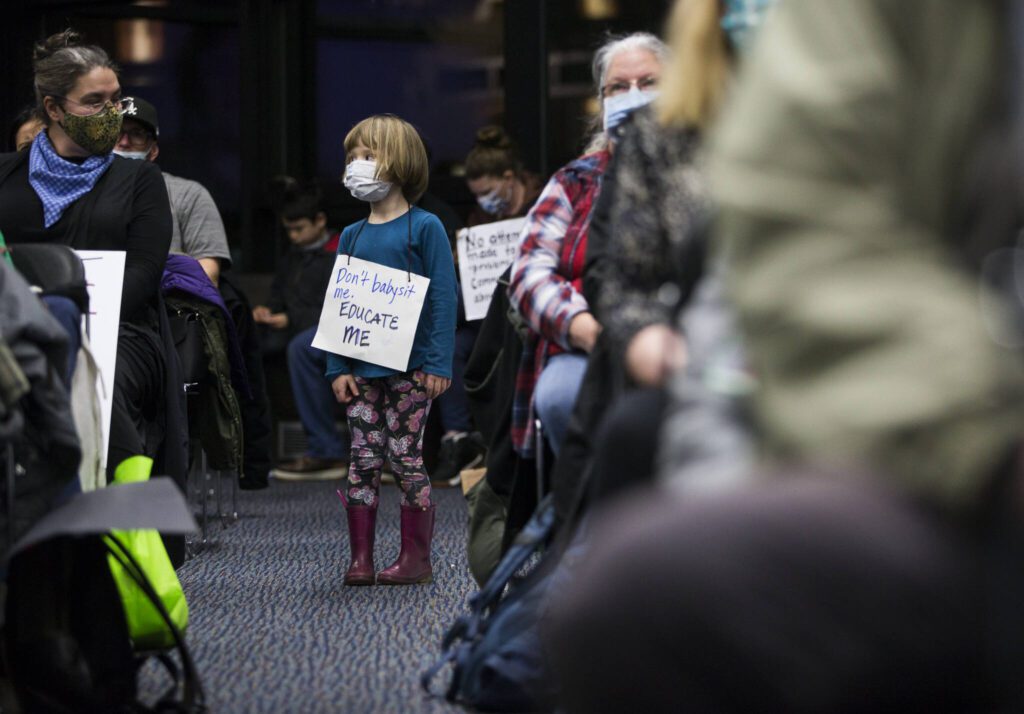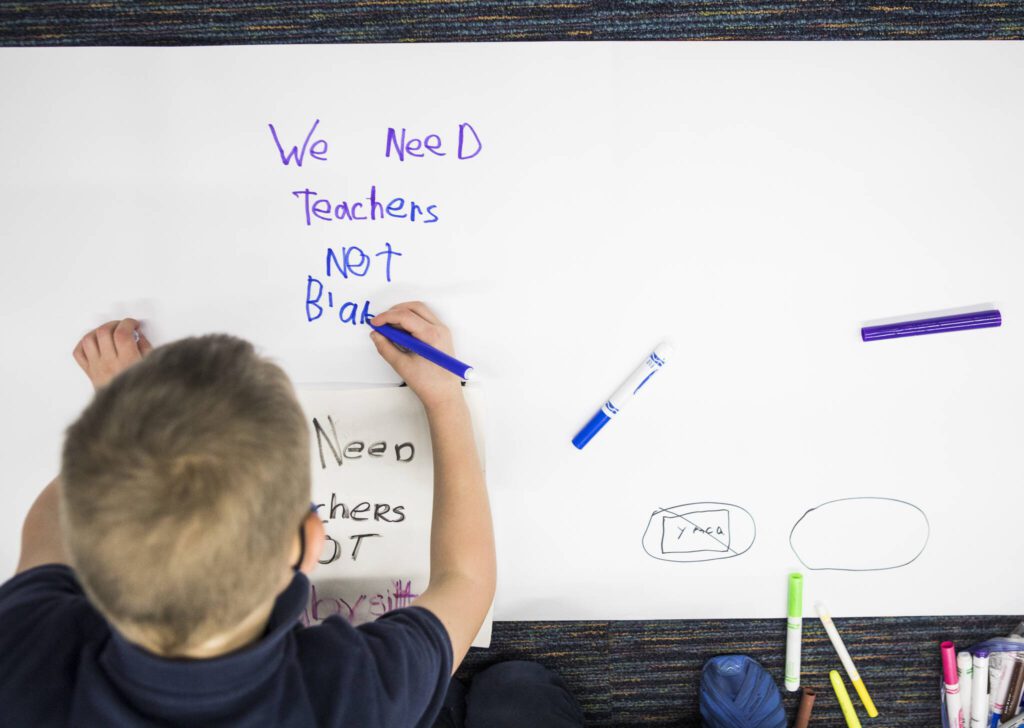EVERETT — When Stephanie Henifin was undergoing cancer treatment, she would look out of the window toward her children.
They were less than a mile away in Everett Community College’s Early Learning Center, being taken care of while she fought the disease from Providence Regional Medical Center in Everett. It brought her comfort to see the campus from Providence, she said, because she trusted the center and knew her kids were safe there.
Now, though, the community college is set to shutter the center, an early childhood education facility that currently serves 71 children. The closure, announced by the college in a May 8 letter, is set to go into effect by June 30. It’s necessary because of the center’s expense, the college said.
For Henifin, who aced some of her tests from hospital beds and got a 4.0 in her classes while undergoing daily radiation treatment, the center is an essential part of her education. Most of her costs are paid for by a federal grant.
Once it closes, she will have no other child care options and will have to drop out of nursing school, she said.
“I always thought the the only thing that would stop me from continuing with school would be cancer. Not budget cuts, right?” Henifin said Wednesday. “I beat this monster of a thing, and I thought that would be the only thing.”
The Early Learning Center, which opened in 1990, is known for being one of the top early education facilities in the state. It’s been nationally accredited and received a Level 5 ranking — the highest possible — from the state Department of Children, Youth, and Families. The center, which focuses on student-parents and parents with lower incomes, has long waiting lists of people hoping to utilize its services.
“It’s being offered to the most vulnerable people in the community, which is so rare,” said Samantha Sommerman, an Everett attorney whose children attend the learning center. “You would expect something this excellent to be only available to rich kids, and we’re finally doing it right. We finally have this subsidized, beautiful, credentialed, well-resourced public early education program, and they want to gut it.”
The college first attempted to close the center in 2021, also for financial reasons. In response, Snohomish County put forward hundreds of thousands of dollars from both the Puget Sound Taxpayer Accountability Account, which counties can use to improve early learning outcomes, and the American Rescue Plan Act, to help fund the center.
The county put forward $249,520 of American Rescue Plan Act dollars between June 2022 and September 2024, said Shelby Burke, vice president of finance at the community college. The county also provided hundreds of thousands of dollars annually through the Puget Sound Taxpayer Accountability Account, known as PSTAA. The county’s 2024-2025 allocation to the college totaled $310,829, county records show.
That allocation paid for repairs to the early learning center, funded a portion of the center’s administrative assistant’s salary and set aside money to hire a consultant to “assess the business model of the Early Learning Center to ensure longevity of the program,” a county document read. The college tried to find a consultant to do that work, but was unable to, said Cathy Leaker, vice president of instruction at Everett Community College.
In 2023, the city of Everett also contributed $150,000 of American Rescue Plan Act funds toward the center for use between October 2024 and September 2025.
But because those American Rescue Plan Act funds are running dry, the college won’t be able to keep paying the bills to operate the school, administrators said. The college expects a $300,000 deficit in the next fiscal year if it stayed open. It would need significant, stable funding to continue operating, administrators said.
“It’s difficult to see a way forward to a funding model that would be sustainable and would allow us to provide the kind of service and support that Snohomish County families deserve and are entitled to,” Leaker said in an interview Tuesday. “It’s hard to imagine what our dream pot of money would look like because even with a huge cash windfall, we’d still have to think about long-term sustainability going forward.”
PSTAA funds, paid for by the Sound Transit 3 ballot measure passed in 2016, are allocated via population amounts, County Council member Megan Dunn said Thursday. It’s unlikely the county could increase its contribution to the college, but it’s possible the college could choose to allocate that funding differently. The community college uses some of the money to pay for other programs, most of which are related to student-parent support.
“We were saddened to hear the news,” Dunn said Thursday. “We haven’t heard any official communication from the college.”
Fellow council member Jared Mead, who helped put forward an ordinance speeding up the permit process for child care centers in March, sees the closure as a potential net positive. The college hopes to work with a state agency, the Department of Enterprise Services, to lease the space to a private child care provider. It has not made a decision on which child care provider could take over the space.
“We know how important it is and we value the child care. We know that we’re in a child care desert in this state,” Burke said.
The center is currently operating below its maximum capacity. It could hold up to about 200 children, Leaker said.
“The guiding star, the North Star for me is more slots,” Mead said Thursday. “Within a child care desert, we need more slots. If they’re closing this in order to find a way to potentially double or triple the amount of kids served, let’s figure out a way to help make that transition for them.”
Dunn said she hopes any contractor that does take over the space would keep the same level of services and retain good-paying union jobs.
State grant programs for pre-kindergarten education are also facing cuts. The Early Childhood Education and Assistance Program is expected to face funding cuts if Gov. Bob Ferguson signs the state budget approved by the legislature. A pilot program serving children under 3 is expected to be cut entirely. The college receives those funds for many of the childhood education slots at its facility; 48 of those are for children aged 3 to 5, 15 of those are for children under 3.
The closure has left staff “scrambling,” said Alejandra Wood, a family support specialist at the center. Administrators informed staff, many of whom are unionized, of the closure on May 7.
“There’s a way to problem solve anything if you can have a conversation around it,” Wood said Wednesday. “What’s frustrating is they never gave us an opportunity to have a conversation to come up with solutions.”
Staff will be laid off, Wood said, but can also turn in their resumes to the college to see if they qualify for another position at the institution.
“Most of the employees in the ELC are represented by a collective bargaining agreement that outlines specific steps the College will take, and rights of impacted employees, in terms of what the closure of the ELC will mean for each employee,” wrote Josh Ernst, the vice president of human resources at Everett Community College. “It’s an ongoing and individualized process and our HR team is working with impacted employees and our labor partners. It would be inappropriate for us to comment further.”
The current state of the child care market is “broken,” according to a 2022 Washington State Department of Commerce report. Child care is expensive and hard to find. Over a quarter of parents who responded to a 2019 Department of Commerce survey had either quit their job or left school because of problems finding child care.
One reason for the difficulty is the high turnover rate in child care employees, experts said at a March County Council meeting. The sector’s average annual turnover rate is 43%, Snohomish County Early Learning Coalition manager Debbie Carlsen said at the meeting. Provider salaries in northwest Washington average less than $40,000 per year, a 2022 survey found.
Many of the staff at the Early Learning Center were highly qualified, Wood said, and had worked there for many years. Wood worked at the center for a decade.
“If you want to accommodate everyone, and north Everett needs a school that can accommodate everyone, then you need highly skilled staff and teachers who have support,” Sommerman said.
College administrators said the decision to close the center was a difficult one. Everett Community College is already facing cuts to its budget from the state to the tune of about $2 million, and its core mission focuses on post-secondary education.
“We’re losing funds to even be able to support that core mission,” Leaker said. “When we have to make really, really painful and hard choices, it’s just incumbent on us to focus on that mission.”
Henifin already had her summer classes picked out before she heard the news of the center’s closure. If everything had gone well, she expected to be a registered nurse within the next two years. She wanted to be able to provide for her family and make a difference in people’s lives.
Now, those plans have been halted.
“I just finished chemo in November. It felt like things were finally going well and I’d finally be able to just do school now,” Henifin said. “Now it’s completely derailed everything. I really don’t know what I’m going to do.”
Will Geschke: 425-339-3443; william.geschke@heraldnet.com; X: @willgeschke.
Correction: A previous version of this article mistakenly misquoted Cathy Leaker.
The original quote: “It’s hard to imagine what our dream pot of money would look like because even with a huge cash windfall, we’d still have to think going forward.”
The corrected quote: “It’s hard to imagine what our dream pot of money would look like because even with a huge cash windfall, we’d still have to think about long-term sustainability going forward.”
Talk to us
> Give us your news tips.
> Send us a letter to the editor.
> More Herald contact information.



























